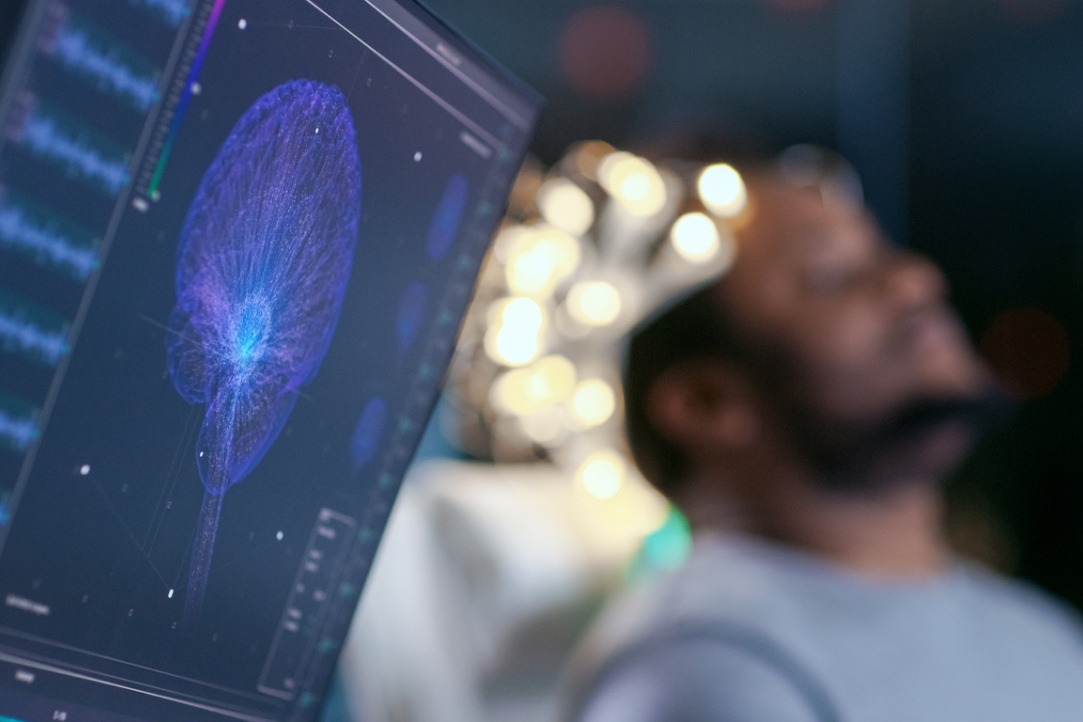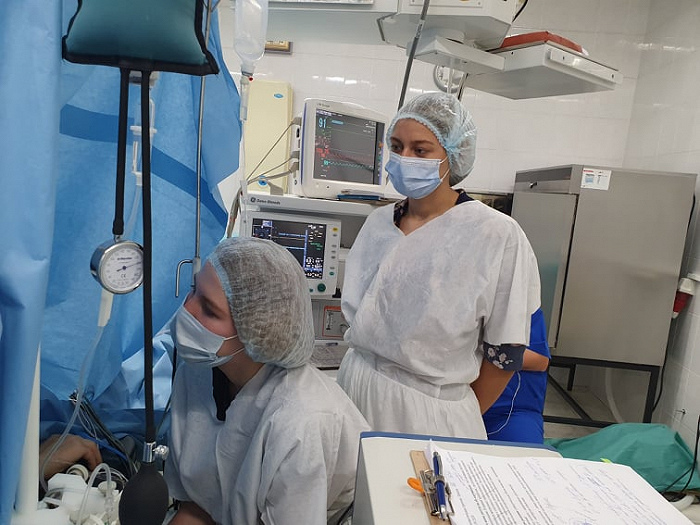Towards Finding Practical Solutions to Socially Significant Healthcare Problems

The Centre for Language and Brain in Nizhny Novgorod started operations in September 2020. Today, it is comprised of a team of linguists - teachers and students - who are researching the relations between speech and parts of the brain. The Director of the Centre, Natalya E. Gronskaya, spoke to the HSE Look about how the neuro-linguistic laboratory appeared in Nizhny Novgorod, as well as current tasks and prospects the Centre can offer the students and the region.

Natalya E. Gronskaya, Director of the Centre for Language and Brain Studies
The opening of the Centre at the Faculty of Humanities in HSE Nizhny Novgorod was possible thanks to the support of Olga Dragoy, the Director of the HSE Centre for Language and Brain in Moscow, who received a research grant from the Russian Science Foundation in 2020.
The staff in Nizhny Novgorod has been closely cooperating with the Moscow Centre for Language and Brain for several years. Empirical and scientific research between the Centre for Language and Brain in Moscow and linguists at HSE Nizhny Novgorod, as well as neurosurgeons from the Privolzhsky Research Medical University (PRMU), began, in the fall of 2017, to perform language testing during awake brain surgeries (for the removal of brain tumors). The new laboratory institutionalizes a research group that already was working out of Nizhny Novgorod, while also setting the foundation for the future formation of a distributed inter-campus Centre for Language and Brain.
Today, the Centre serves as a unique scientific structure in the region that carries out fundamental and applied tasks related to the cerebral basis of language. In addition to research activities, the Centre has an educational function and can serve as a base for programmes in neurolinguistics that are unique in Russia regions.
We have a combination of the resources and competencies of three major institutions (HSE Nizhny Novgorod, the Centre for Language and Brain in Moscow, and PRMU) with plans for further collaboration with other universities and clinical organizations in the region. The opening of the Centre at the Faculty of Humanities allows us to combine theoretical linguistics and applied context (awake surgeries, patients with speech impairments).

The Centre’s regional research agenda is oriented towards finding practical solutions to socially significant healthcare problems in the Nizhny Novgorod Region and the Volga Federal District - rehabilitation of patients with speech impairment - a study of speech disorders in the elderly and correction of speech disorders in children (including those with autistic spectrum disorders).
Our theoretical research will address what happens to the ‘tongue-brain’ connection after surgeries and injuries, cases of language delay and speech impairment in children, and whether it is possible to influence these processes.
This empirical research will include experimental activities (e.g., development and validation of various types of tests both for adults and children, mapping different parts of the brain during surgeries, collecting and processing Big Data, etc.), development of new methods for testing and the rehabilitation of patients with speech impairments, creation of alternative communication devices for adults and children with speech disorders.
Centre’s Goals
The development of the Centre is line with the strategic goals of the HSE Nizhny Novgorod with respect to scientific/academic development, i.e., its development as an advanced regional research centre. We aim to create and develop a neuro-linguistic school in Nizhny Novgorod through the introduction of a specifically neuro-linguistic approach to the educational process at the Faculty of Humanities, as well as train and get HSE Nizhny Novgorod students involved in neuro-linguistic experiments in order to popularize the Centre’s work.
We also aim to transform our scientific results into replicated and demanded practical tools, e.g., the application of the findings from brain injury research in clinical and pedagogical practice (in children with speech disorders trying to learn foreign languages), as well as the further possible commercialization of these developments. Moreover, the multidisciplinary nature of neurolinguistics itself will contribute to research activities at HSE Nizhny Novgorod through bringing together researchers from the various branches of science.
We plan to expand the Centre’s activities to address speech disorders in children, develop and improve existing speech therapy programmes for adults and children with subsequent clinical testing and implementation in clinical practice.
Natalya E. Gronskaya
Director, Centre for Language and Brain in Nizhny Novgorod
Olga Dragoy
Director, Center for Language and Brain
See also:
Scientists Uncover Why Consumers Are Reluctant to Pay for Sugar-Free Products
Researchers at the HSE Institute for Cognitive Neuroscience have investigated how 'sugar-free' labelling affects consumers’ willingness to pay for such products. It was found that the label has little impact on the products’ appeal due to a trade-off between sweetness and healthiness: on the one hand, the label can deter consumers by implying an inferior taste, while on the other, it signals potential health benefits. The study findings have been published in Frontiers in Nutrition.
Internal Clock: How Heart Rate and Emotions Shape Our Perception of Time
Our perception of time depends on heart rate—this is the conclusion reached by neuroscientists at HSE University. In their experiment, volunteers watched short videos designed to evoke specific emotions and estimated each video's duration, while researchers recorded their heart activity using ECG. The study found that the slower a participant's heart rate, the shorter they perceived the video to be—especially when watching unpleasant content. The study has been published in Frontiers in Psychology.
Scientists Develop New Method to Detect Motor Disorders Using 3D Objects
Researchers at HSE University have developed a new methodological approach to studying motor planning and execution. By using 3D-printed objects and an infrared tracking system, they demonstrated that the brain initiates the planning process even before movement begins. This approach may eventually aid in the assessment and treatment of patients with neurodegenerative diseases such as Parkinson’s. The paper has been published in Frontiers in Human Neuroscience.
HSE Scientists Test New Method to Investigate Mechanisms of New Word Acquisition
Researchers at the HSE Centre for Language and Brain were among the first to use transcranial alternating current stimulation to investigate whether it can influence the acquisition of new words. Although the authors of the experiment have not yet found a link between brain stimulation and word acquisition, they believe that adjusting the stimulation parameters may yield different results in the future. The study has been published in Language, Cognition and Neuroscience.
Twenty vs Ten: HSE Researcher Examines Origins of Numeral System in Lezgic Languages
It is commonly believed that the Lezgic languages spoken in Dagestan and Azerbaijan originally used a vigesimal numeral system, with the decimal system emerging later. However, a recent analysis of numerals in various dialects, conducted by linguist Maksim Melenchenko from HSE University, suggests that the opposite may be true: the decimal system was used originally, with the vigesimal system developing later. The study has been published in Folia Linguistica.
When Thoughts Become Movement: How Brain–Computer Interfaces Are Transforming Medicine and Daily Life
At the dawn of the 21st century, humans are increasingly becoming not just observers, but active participants in the technological revolution. Among the breakthroughs with the potential to change the lives of millions, brain–computer interfaces (BCIs)—systems that connect the brain to external devices—hold a special place. These technologies were the focal point of the spring International School ‘A New Generation of Neurointerfaces,’ which took place at HSE University.
How the Brain Responds to Prices: Scientists Discover Neural Marker for Price Perception
Russian scientists have discovered how the brain makes purchasing decisions. Using electroencephalography (EEG) and magnetoencephalography (MEG), researchers found that the brain responds almost instantly when a product's price deviates from expectations. This response engages brain regions involved in evaluating rewards and learning from past decisions. Thus, perceiving a product's value is not merely a conscious choice but also a function of automatic cognitive mechanisms. The results have been published in Frontiers in Human Neuroscience.
Electrical Brain Stimulation Helps Memorise New Words
A team of researchers at HSE University, in collaboration with scientists from Russian and foreign universities, has investigated the impact of electrical brain stimulation on learning new words. The experiment shows that direct current stimulation of language centres—Broca's and Wernicke's areas—can improve and speed up the memorisation of new words. The findings have been published in Neurobiology of Learning and Memory.
Researchers Uncover Specific Aspects of Story Comprehension in Young Children
For the first time, psycholinguists from the HSE Centre for Language and Brain, in collaboration with colleagues from the USA and Germany, recorded eye movements during a test to assess narrative skills in young children and adults. The researchers found that story comprehension depends on plot structure, and that children aged five to six tend to struggle with questions about protagonists' internal states. The study findings have been published in the Journal of Experimental Child Psychology.
Scientists Find Out Why Aphasia Patients Lose the Ability to Talk about the Past and Future
An international team of researchers, including scientists from the HSE Centre for Language and Brain, has identified the causes of impairments in expressing grammatical tense in people with aphasia. They discovered that individuals with speech disorders struggle with both forming the concept of time and selecting the correct verb tense. However, which of these processes proves more challenging depends on the speaker's language. The findings have been published in the journal Aphasiology.


